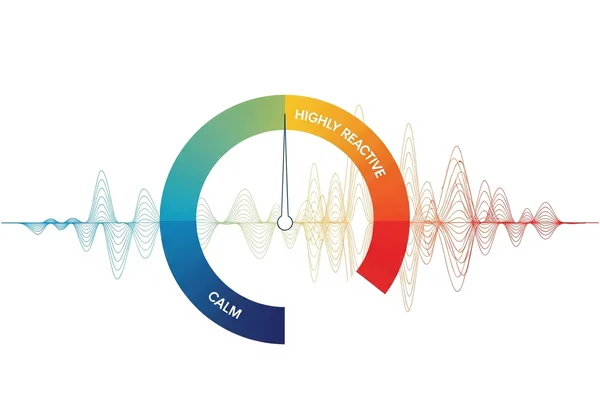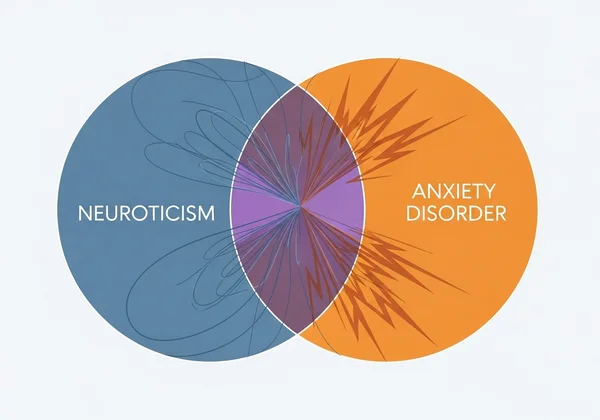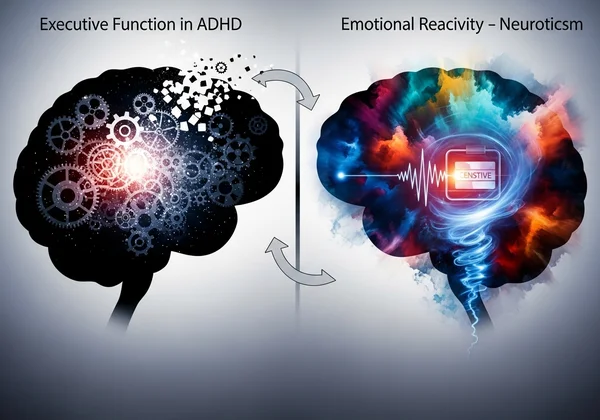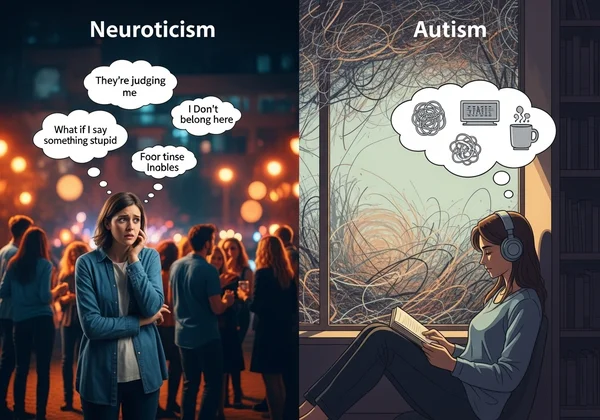Neuroticism Test: Understanding Differences from ADHD & Autism
September 2, 2025 | By Alicia Campos
Feeling overwhelmed by your emotions? In a world of endless information, it's easy to fall down a rabbit hole trying to understand your own mind. Many people wonder if their intense feelings, worries, or social difficulties are signs of high neuroticism, ADHD, or even autism. This guide is here to untangle the confusion. We'll explore the distinct differences and key overlaps between these experiences to help you find clarity. Understanding your unique emotional landscape is the first step toward personal growth, and a Neuroticism Test can be a powerful tool in that journey. Am I neurotic or just anxious? Let's find out together. The path to self-insight begins with asking the right questions, and you can start your journey here.
Understanding Neuroticism: More Than Just Anxiety
Before comparing neuroticism to other conditions, it's crucial to understand what it truly is. Neuroticism is not a disorder but one of the "Big Five" personality traits, a cornerstone of modern psychology. It represents a tendency to experience negative emotions like anxiety, worry, anger, and sadness. Think of it as your emotional sensitivity dial—some people's are just set higher than others.
A person with high neuroticism might find themselves ruminating on past mistakes, worrying about future events, and reacting more strongly to life's stressors. This isn't a personal failing; it's a fundamental aspect of their personality wiring. While it can present challenges, it can also foster conscientiousness and a deep capacity for empathy. Finding out where you land on this spectrum can be incredibly validating and is a key part of self-discovery.

Defining the Core Personality Trait
Neuroticism is fundamentally about emotional stability versus instability. Those low in neuroticism are typically calm, emotionally stable, and resilient in the face of stress. In contrast, those high in neuroticism are more emotionally reactive. Key facets of this trait include:
- Anxiety: A tendency to worry and feel nervous.
- Hostility: A propensity for anger and frustration.
- Depression: A tendency toward feelings of sadness and hopelessness.
- Self-Consciousness: Feeling easily embarrassed or shy.
- Impulsiveness: Difficulty resisting urges or cravings.
- Vulnerability: A heightened sensitivity to stress.
Understanding these components helps clarify that neuroticism is a broad personality dimension, not a single symptom. An online personality test can provide a structured way to measure these tendencies.
The Overlap with Anxiety: Where Personality Meets Disorder
This is a major point of confusion. High neuroticism is a significant risk factor for developing anxiety disorders, but they are not the same thing. Neuroticism is the tendency to feel anxious, while an anxiety disorder is a clinical condition where anxiety becomes persistent, overwhelming, and disruptive to daily life.
Think of it this way: a person with high neuroticism might worry about an upcoming presentation for a few days. A person with an anxiety disorder might experience panic attacks, avoid social situations altogether, and find their anxiety spirals out of control without a specific trigger. An emotional stability test can help you gauge your personality-based tendencies, which is a different goal than a clinical diagnosis.

Neuroticism vs. ADHD: Distinguishing Focus & Emotional Regulation
Another common area of overlap is between neuroticism and Attention-Deficit/Hyperactivity Disorder (ADHD). Both can involve feelings of being overwhelmed and difficulty managing emotions, but the underlying mechanisms are very different. The confusion often stems from a concept called emotional dysregulation.
ADHD is a neurodevelopmental disorder that primarily affects the brain's executive functions—the systems that manage attention, organization, and impulse control. While high neuroticism is rooted in emotional sensitivity, the challenges of ADHD are rooted in how the brain processes information and regulates behavior. Gaining clarity on this difference is essential for finding the right coping strategies.
Core Characteristics of Attention-Deficit Disorder
ADHD is primarily characterized by a persistent pattern of inattention and/or hyperactivity-impulsivity. Key traits include:
- Inattention: Difficulty sustaining focus, being easily distracted, and struggling with organization and task completion.
- Hyperactivity: Feeling restless, fidgeting, and having an inability to stay seated.
- Impulsivity: Acting without thinking, interrupting others, and having difficulty waiting for one's turn.
These are not personality preferences; they are the result of differences in brain structure and chemistry.
How Emotional Dysregulation Differs
Both individuals with high neuroticism and those with ADHD can experience intense emotions, but the triggers and expression differ.
-
In Neuroticism: Emotional reactions are often triggered by internal thoughts, worries, and perceived threats. The emotional response is characterized by rumination and prolonged feelings of anxiety or sadness. It's an overactive "threat detection" system.
-
In ADHD: Emotional dysregulation is often linked to frustration, impatience, and difficulty inhibiting immediate reactions. The emotional response can be explosive and quick to pass, often triggered by external events like being interrupted or facing an obstacle. It's more of a "faulty brake" system for emotions. A test for neuroticism helps isolate the personality component from these other factors.

Is Neuroticism a Form of Autism? Examining the Spectrum
A frequent question that arises is whether neuroticism is a form of autism. The short answer is no. Autism Spectrum Disorder (ASD) is a complex neurodevelopmental condition that fundamentally affects social interaction, communication, and behavior. While some surface-level behaviors might seem similar, their origins are entirely distinct.
Someone with high neuroticism might avoid social events due to anxiety and fear of judgment. An autistic individual might avoid the same events because of sensory overload, difficulty interpreting social cues, or a preference for solitude. The underlying motivation is different. Understanding this distinction is vital for self-acceptance and for seeking the appropriate support.
Key Traits of Autism Spectrum Disorder
ASD is defined by two core areas of difficulty:
- Social Communication and Interaction: This includes challenges with back-and-forth conversation, understanding nonverbal cues (like body language or tone of voice), and developing and maintaining relationships.
- Restricted, Repetitive Patterns of Behavior: This can manifest as repetitive movements (stimming), intense interest in specific topics, insistence on sameness and routine, and heightened or lowered sensitivity to sensory input (like sounds, lights, or textures).
These traits are developmental and are present from early childhood, though they may not be recognized until later in life.
Similar Behaviors, Different Roots: Understanding Social and Emotional Differences
It's easy to see why confusion arises. Both a highly neurotic person and an autistic person might seem socially withdrawn or experience emotional distress. However, the "why" behind the behavior is the key differentiator.
For example, difficulty with eye contact in neuroticism is often driven by self-consciousness and social anxiety. In autism, it can be due to it feeling unnatural, overwhelming, or distracting. Similarly, an emotional meltdown in neuroticism is typically a response to overwhelming stress or worry, whereas in autism, it can be a "shutdown" or "meltdown" triggered by sensory overload or a break in routine. Taking a free neuroticism test can help clarify if your challenges are rooted in emotional reactivity rather than neurodevelopmental differences.

Why Accurate Self-Understanding Empowers Your Well-being
Distinguishing between a personality trait like neuroticism and neurodevelopmental conditions like ADHD and autism is more than just an academic exercise. It's the key to unlocking effective strategies for managing your well-being. Trying to apply ADHD focus techniques to neurotic anxiety, or anxiety-management tools to autistic sensory overload, is often ineffective.
When you understand the true source of your challenges, you can:
- Find the right tools: You can seek out coping mechanisms tailored to your specific needs.
- Practice self-compassion: Recognizing that you're dealing with a personality trait or a neurotype, not a character flaw, can reduce self-criticism.
- Communicate your needs: You can better explain your experiences to friends, family, and professionals.
- Set realistic goals: Understanding your baseline allows you to work with your brain, not against it.
Gaining this initial clarity is a powerful act of self-care. It provides a foundation upon which you can build a more fulfilling and emotionally balanced life.
Your Path to Clearer Self-Insight Starts Here
Navigating the complexities of your inner world can feel daunting, but you don't have to do it alone. Understanding the differences between neuroticism, ADHD, and autism is a crucial step toward gaining the self-awareness needed for genuine personal growth. While this guide provides clarity, the next step is discovering your own unique profile.
By focusing on your personality traits first, you can build a solid foundation of self-knowledge. Our scientifically-backed Neuroticism Test is designed to help you understand your emotional stability and reaction patterns. It’s a free, confidential, and empowering first step. Discover your results today and begin the journey to knowing yourself better.
Common Questions on Neuroticism, ADHD, & Autism
Is Neuroticism the Same as Anxiety?
No. Neuroticism is a broad personality trait that describes a tendency to experience negative emotions, including anxiety. An anxiety disorder is a clinical diagnosis where anxiety is persistent and impairs daily functioning. High neuroticism is a risk factor for anxiety disorders, but you can be high in neuroticism without having a clinical disorder.
Can Someone Have Both Neuroticism and ADHD or Autism?
Absolutely. Neuroticism is a personality trait that exists on a spectrum for everyone, including those with ADHD or autism. An individual can be autistic and also have a highly neurotic personality, which might amplify their experience of anxiety. Similarly, someone with ADHD can have either high or low neuroticism, affecting how they emotionally respond to their ADHD-related challenges.
How Does a Neurotic Person Typically Behave?
A person high in neuroticism may appear worried, stressed, or emotionally sensitive. They might overthink situations, anticipate negative outcomes, and react more strongly to setbacks. They may also be more prone to feelings of guilt, sadness, or anger. However, they can also be highly empathetic, self-aware, and motivated to avoid risks. To see where you fall, you can take a personality test neuroticism.
What Does a High Neuroticism Score Mean?
A high neuroticism score on a Big Five personality test suggests you have a greater tendency to experience emotional instability and negative feelings like worry and irritability. It does not mean you are "broken" or have a disorder. It simply provides insight into your emotional baseline. Understanding this can empower you to develop effective coping strategies for managing stress and improving your overall well-being. Our test provides a score and detailed insights to help you on this path.